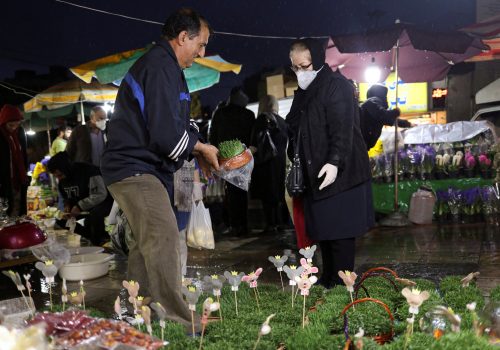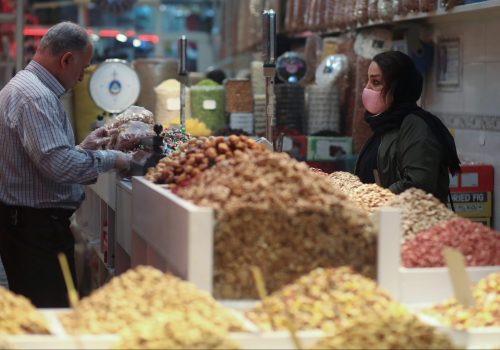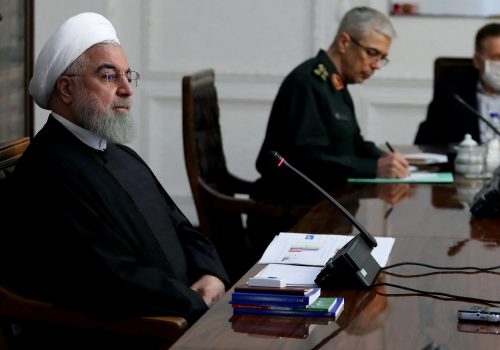Iranian officials troll the US handling of the coronavirus to hide their own failings
Iranian officials have taken to firing aggressive and sometimes disparaging remarks deriding the Western—especially American—response to the coronavirus outbreak in an apparent attempt to counter criticism of their own shortcomings.
The targets of their harsh criticisms haven’t spared Iran’s allies, either. On April 5, health ministry spokesman Kianush Jahanpur took to Twitter and called China’s initial reports of coronavirus cases “a bitter joke” that led other countries to underestimate the severity of the disease. However, there was a swift backlash not only from the Chinese ambassador to Tehran, but also the Iranian foreign ministry, whose spokesman Abbas Mousavi followed up with a tweet praising Beijing for its suppression of the pandemic and for “generously aiding countries across the world.” Iran, under US sanctions, is wary of offsetting its strong commercial ties with China, which has shipped several consignments of medical items to Iran in the wake of the COVID-19 pandemic.
Nevertheless, Iranian officials and state media have saved their most condescending criticisms for the West. Exuding inflated self-confidence, they portray Iran as having a first-class health infrastructure capable of containing the outbreak despite economic difficulties caused by US sanctions.
The health ministry’s refusal to allow Doctors Without Borders (MSF) to set up a field hospital is a case in point. On March 22, MSF announced that it had sent a fifty-bed inflatable hospital and an emergency team to Isfahan—which was the second worst affected province in Iran at the time—to increase hospital capacity for treating patients infected with coronavirus.
The next day, a health ministry official reported Tehran’s rejection of the MSF effort. “Thanks MSF but given our armed forces’ full medical capacity, there’s no need for foreigners to set up hospital beds, and your presence is terminated,” tweeted Alireza Vahabzadeh, a media advisor to the health ministry.
Under pressure, the Iranian government eventually allowed MSF to stay, but only to help foreign nationals affected by the virus.
Still, much of the fault of Iran’s shortcoming has been placed on US sanctions, which Tehran has described as economic and medical “terrorism.”
For more than a week, the Iranian Foreign Ministry and the US State Department have been engaged in juvenile-like Twitter exchanges. It started after Iranian Foreign Minister Mohammad Javad Zarif tweeted on March 29 that the “US has gone from sabotage & assassinations to waging an economic war & #EconomicTerrorism on Iranians—to #MedicalTerror amidst #covid19iran.” The tweet included a “sanction” graphic with a COVID-19 image superimposed on the letter “O”. The following day, the State Department’s spokeswoman Morgan Ortagus responded on Twitter: “Stop lying. Stop stealing. If the Iranian regime needs funds to deal with the #coronavirus, it can access billions in @khamenei_ir’s tax-free hedge fund.” The tweet included a “billions” graphic with the Supreme Leader’s face superimposed over the letter “O”.
The Iranian Foreign Ministry’s Twitter account quickly retaliated by adding Secretary of State Mike Pompeo to the “sanction,” with the COVID-19 image superimposed on the letter “O”. Then, on April 7, the State Department Persian language account superimposed the word “lie” over an image of the Iranian Foreign Ministry building and tweeted: “For further information about the ‘Iranian regime’s deception in order to get relief from the sanctions,’ go to the virtual page of the US Embassy in Tehran.”
On the same day, in a tweet tinged with his routine sarcasm, Zarif, again, lambasted US sanctions: “Iran is rich in human & natural resources. We don’t need charity from @realDonaldTrump… What we want is for him to STOP preventing Iran from selling oil & other products, buying its needs & making & receiving payments.”
Zarif was referring to Iran’s interest in exporting at least 700,000 barrels of oil per day—ideally up to 1.5 million—if the West negotiates with Tehran to save the 2015 nuclear deal; US President Donald Trump withdrew from the agreement in 2018 and reimposed sanctions that have devastated the Iranian economy.
While US sanctions exempt the sale of medicine and medical devices, secondary sanctions deter many international firms from humanitarian trade with Iran. Even as it imposed fresh sanctions on Iran in March, the US offered it humanitarian aid, an offer that was rejected and which Zarif was alluding to.
Iranian officials are, apparently, hoping that, by blaming the US, they can deflect some of the anger people have toward their government, which, initially, hid the news about the spread of coronavirus and only recommended social distancing a month after the virus was first detected in the holy city of Qom in late February. Even as the official number of COVID-19 cases has risen to almost 65,000 and the death toll is nearing 4,000, President Hassan Rouhani refuses to place Iranian cities under quarantine for economic concerns. He has even charged, without evidence, that “counterrevolutionaries are plotting to shut down economic production in Iran.”
President Rouhani, during one of his almost daily briefings on March 28, gave a rundown of the work of the National Coronavirus Combat Taskforce, assuring Iranians on state television that his country had not run into “that much of a problem.” He listed how Iran has done so much better than other nations, saying that Iran is not one of those countries where patients are dumped in hospital corridors or on sidewalks, where “refrigerated trucks are standing by to pick up large number of corpses.” The Iranian president added: “This may come as a surprise to the world—how a country under sanctions has been able to equip its hospitals while its doctors and nurses enjoy high morale.”
State media is rife with reports of a chaotic American health system. Fars News Agency, which is affiliated with the Revolutionary Guards, quoted an American doctor complaining on social media that US hospitals care more about profits than people’s lives. Every Iranian news outlet reported the death of an American teen from coronavirus because he did not have health insurance. Even Supreme Leader Ayatollah Ali Khamenei ridiculed the Trump administration’s handling of the pandemic: “Confiscating other nations’ masks, emptying shops, fighting over toilet paper and long lines for buying guns during the #CoronaOutbreak are the logical and natural outcome of the philosophy that governs #western civilization.”
Meanwhile, health ministry officials have taken to Twitter as never before, retweeting American media reports of how the US is lagging behind as the number of the dead and infected skyrocket. In a tweet accompanied by a New York Post photo of nurses at Mount Sinai West, under the headline, ‘Worker at NYC hospital where nurses wear trash bags as protection dies from coronavirus,’ spokesman Jahanpur mocked: “This is the result of US sanctions in New York’s hospitals. This photo must reach @realDonaldTrump and a copy sent to @SecPompeo for their formation and followup.”
In another tweet, Jahanpur wrote above photos of an American neurologist wearing a garbage bag on his head, with a face mask made from a plastic take-out dinner container: “America’s sanctions against the people produce such creativities among doctors and nurses of this land in order to protect themselves against corona.”
The previous day, spokesman Jahanpur had tweeted: “We don’t wish ill for anyone, even the enemy… We ask God for a speedy recovery for all patients, especially those who are sick at heart.”
Boasting about his country’s superior care for the elderly—and, apparently, ridiculing the practice of triage in some Western nations—health ministry media advisor Vahabzadeh tweeted: “Many countries do not prioritize treatment of the elderly, and many die at home due to lack of facilities. But here in Iran, at Kahrizak Nursing Home, doctors and nurses leave no stone unturned to keep a grandmother and a grandfather alive.”
While some have been supportive, most Iranian twitter users’ reactions have been critical of government officials.
On Twitter, a user responding to Jahanpur’s tweets, said: “Our country’s officials see the failures of other countries in fighting corona[virus] as their own success.”
Another tweeted: “What accolades have you bestowed on our [medical] personnel that you are being sarcastic?”
“You don’t need to rejoice over the West’s lack of success,” noted a Twitter user.
Scheherazade Faramarzi is a veteran journalist who covered the Iranian revolution, the Iran-Iraq war, hostage crises and Iran-Contra affair. She went on to report from across the Middle East as well as Pakistan, Afghanistan, North Africa and Europe for the Associated Press.
Image: A man walks between beds at a shopping mall, one of Iran's largest, which has been turned into a centre to receive patients suffering from the coronavirus disease (COVID-19), in Tehran, Iran, April 4, 2020. (Reuters)


